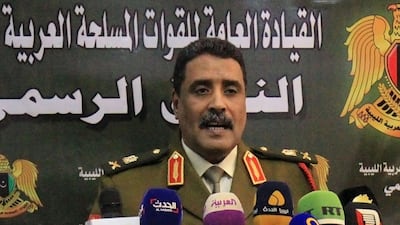Gunfire echoed through the Libyan town of Sirte on Monday afternoon but the final battle for the strategic city was over in a matter of hours.
Ahmed Awas, 42, a petroleum engineer who lives in central Sirte, said he could hear the fighting close to his neighbourhood. The advancing troops, he said, included fighters from the area.
Nine months into the push by the eastern Libyan National Army to capture the capital of Tripoli and end what it calls the rule of militias that back the Government of National Accord, the forces of Field Marshal Khalifa Haftar have made a significant gain.
Despite the wider offensive making slow progress, the “lightning” offensive for the hometown of former longtime president Muammar Qaddafi was over almost as soon as it began.
The coastal highway that runs from the second city of Benghazi to the country’s capital of Tripoli was the main front in the brief Nato-backed campaign to topple Qaddafi in 2011. Sirte lies halfway between Tripoli and Benghazi on Libya’s porous coastline on the Mediterranean.
It is about 450 kilometres east of Tripoli, located on the western edge of Libya’s “oil crescent,” a network of oil export terminals captured by Field Marshal Haftar in 2016.
Forces aligned with Libya's GNA based in Tripoli said on Tuesday that they had withdrawn to avoid bloodshed and “the youth of the forces" as they lost control.
The GNA aligned Sirte Protection Force largely comes from the nearby Misrata, once a hub of the revolution against Qaddafi and now one of the main sources of militia fighters for the GNA.
The factions took control of the city in 2016 after expelling ISIS, who held the town for a year, with the help of US airstrikes and Special Forces.
While the Sirte Protection Force said it had withdrawn and was awaiting orders, the LNA on Tuesday said its forces had pushed through the town of 120,000 and had clashed with the militias near Abu Grain on the road to Misrata.
“We were received with cheers," an LNA spokesman told Reuters after the battle.
The capture of Sirte gives Field Marshal Haftar’s forces a much-needed morale boost at a time when they have been bogged down for months on the outskirts of Tripoli, unable to smash through the defences of militias loyal to GNA.
It is also a timely victory given that Turkey, which is allied with the Tripoli government, says it has begun deploying troops to help the Tripoli government defend the capital in a move condemned internationally.
Sky News Arabia also reported that Tunisia has rejected a request by Turkey to allow Ankara to transport military equipment through Tunis. In late December, President Recep Tayyip Erdogan met the new Tunisian president, Kais Saied. Following the talks, Tunisia rejected reports from Ankara that the two leaders had agreed on the outlook of the conflict and reiterated the need for a political solution.
The United Nations Security Council on Monday said it was concerned about an escalation in Libya and Ghassan Salame, the UN special representative to the country, said he was “angry” about foreign interference.
After a two-hour meeting with the UN Security Council, Mr Salame said "What I asked these countries is very clear: keep out of Libya. There is enough weapons in Libya, they don't need extra weapons.”
